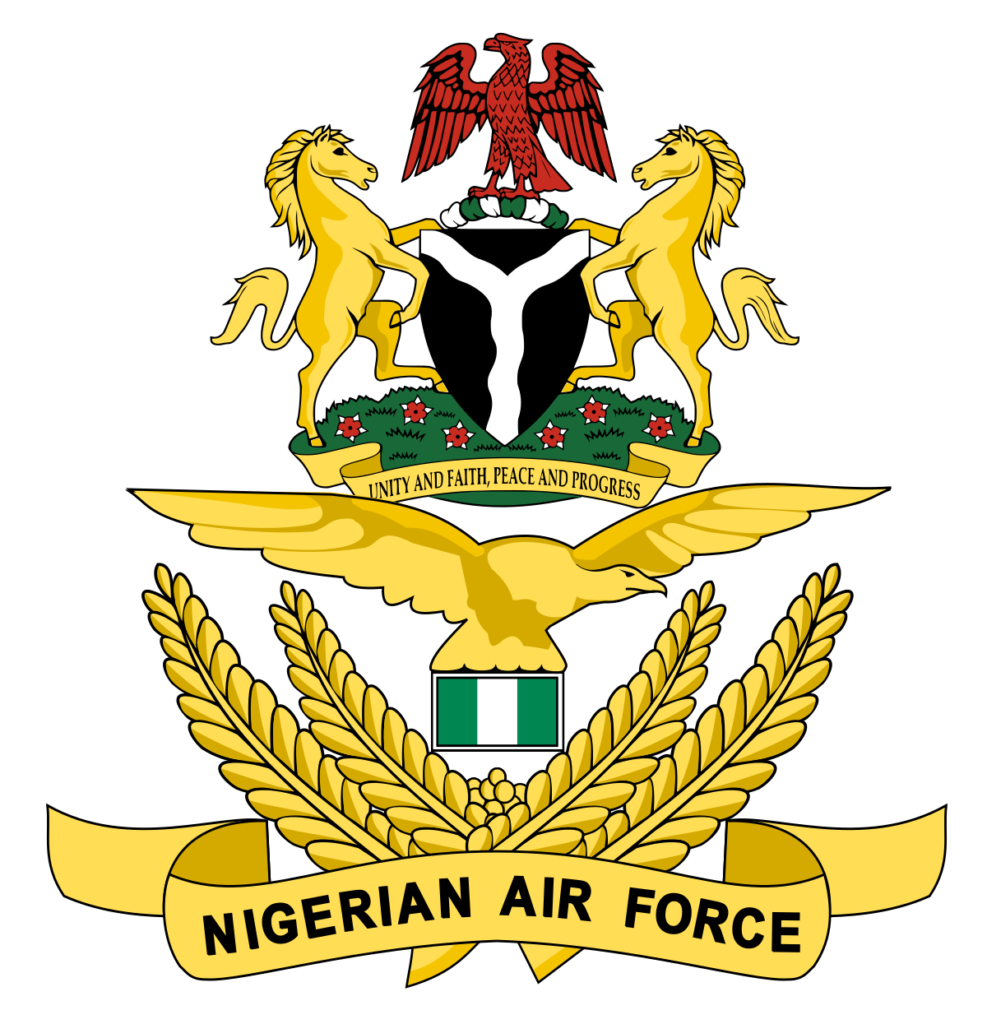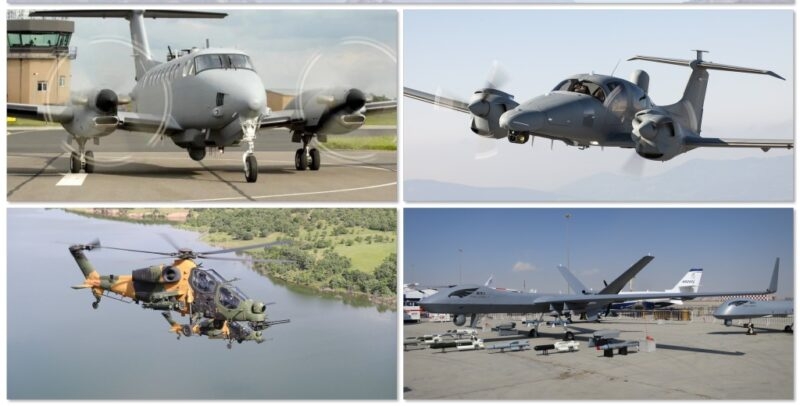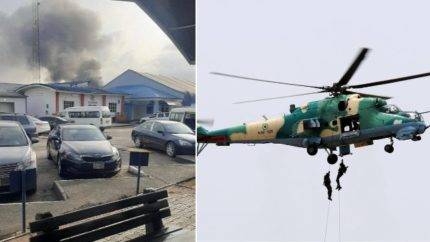In a startling turn of events, a Nigerian Air Force (NAF) MI-35P helicopter crash-landed and subsequently exploded at the NAF Base in Port Harcourt on Friday morning, marking a dramatic incident that raised concerns about the safety of military operations. The cause of the crash remains shrouded in mystery, with authorities unable to immediately determine the precise factors leading to the unfortunate event. Eyewitnesses reported the incident occurring approximately at 7:50 am local time, indicating a sudden and unexpected catastrophe within the military establishment.
One eyewitness, whose proximity to the scene allowed for a firsthand account, described the moment as a jarring experience. “I was inside my apartment when I heard this thunderous sound at the Nigerian Air Force Base,” the witness recounted. “The next thing I saw was a thick flame. I don’t know if there are casualties because I can’t go close to the scene for now. But I heard a blast twice.” This testimony underscores the intensity and the gravity of the situation, hinting at the severity of the explosion that rocked the vicinity.

Nigerian Air Force Confirmed Details and Immediate Responses
Confirming the crash, Air Commodore Edward Gabkwet, the Nigerian Air Force Director of Public Relations and Information, revealed that the ill-fated helicopter, designated MI-35P, had taken off for a mission targeting oil thieves in Rivers State. Despite the catastrophic crash, the fortunate aspect of the incident emerged with the revelation that all five occupants on board survived the ordeal, sustaining minor injuries. In an official statement, Air Commodore Gabkwet stated, “Fortunately, the entire crew of five survived the crash with very minor injuries and are currently being attended to at Nigerian Air Force Medical Centre Port Harcourt.” This news, amidst the devastation, offered a glimmer of relief concerning the safety of those involved.
As the aftermath of the crash unfolded, the Chief of Air Staff, Air Marshal Hasan Abubakar, swiftly initiated a response by heading to the crash site to assess the situation firsthand. This immediate action by the military leadership demonstrates a proactive stance, emphasizing the gravity of the incident and the importance of evaluating the conditions on-site. Moreover, the statement released highlighted the inherent risks associated with military aviation, emphasizing the dangers encountered by Nigerian Air Force personnel in their noble commitment to safeguarding the nation and combating criminal elements.

Implications and Safety Concerns
The crash of the NAF MI-35P helicopter raises pertinent questions regarding the safety protocols and operational risks prevalent within military aviation. This incident serves as a stark reminder of the inherent hazards faced by pilots and technicians engaged in the daunting responsibility of defending the nation. Furthermore, it underscores the critical need for stringent safety measures and continuous assessments to mitigate potential risks and safeguard the lives of those involved in military operations.
As investigations into the cause of the crash continue, the episode stands as a testament to the challenges encountered by the Nigerian Air Force in the execution of its duties. The incident not only demands a thorough investigation into its root cause but also necessitates a reevaluation of safety protocols and measures to prevent similar occurrences in the future. The outcome of this investigation and subsequent measures taken by the Nigerian Air Force to address safety concerns will undoubtedly be closely monitored by concerned stakeholders and the public at large.
History of Plane Crashes in Nigeria
Nigeria has experienced a series of tragic plane crashes throughout its history, resulting in devastating loss of lives and properties. The timeline of these catastrophic incidents paints a grim picture of aviation disasters within the country. From the inaugural crash in 1942 on Igbo Ilapa Hill during World War II to the more recent crashes in 2021 involving military aircraft, Nigeria has been plagued by numerous aviation tragedies. The crashes have ranged from international airlines to Nigerian-owned aircraft, highlighting a concerning pattern of fatal accidents.
Some of the significant incidents include the crash of a British Overseas Airways Corporation (BOAC) aircraft in 1956, the first Nigerian-owned aircraft crash in 1969, and multiple crashes involving Nigeria Airways and various other airline carriers. These incidents have often resulted in substantial casualties, underscoring the severity and recurrent nature of plane crashes in Nigeria.
Causes of Plane Crashes in Nigeria
Analysis by aviation authorities indicates that the majority of aviation accidents in Nigeria are attributable to human errors, accounting for a staggering 70% of incidents. Corruption and poor leadership within private companies often lead to non-compliance with safety regulations, undermining the effectiveness of oversight and regulation. Moreover, engine failure, especially during crucial stages like landing, has been a recurrent cause of several crashes, including the tragic 2012 DANA plane crash.
Other contributing factors include adverse weather conditions that obstruct pilot visibility and accurate flight control, inadequate communication systems between the cockpit and control towers, insufficient training of aviation personnel, subpar facilities, crew fatigue, and inadequate maintenance protocols.
Preventative Measures to Avert Future Plane Crashes
To mitigate the recurrence of such disasters, it is imperative for all stakeholders in the aviation industry to prioritize operating airworthy equipment and fostering a robust regulatory environment. The Nigerian Civil Aviation Authority (NCAA) must enforce and uphold stringent safety standards prescribed by the International Civil Aviation Organization (ICAO). This entails continuous monitoring, strict adherence to regulations, and swift punitive actions against non-compliant operators, including the revocation of operating licenses for offenders.
By emphasizing compliance, instituting rigorous safety measures, enhancing training programs for aviation personnel, investing in advanced communication technology, and bolstering maintenance practices, the aviation sector can significantly reduce the incidence of plane crashes in Nigeria. This concerted effort is essential to safeguarding human lives and fostering a culture of aviation safety within the country.
For more safety tips and guidelines regarding air travel, refer to our comprehensive coverage on “Safety tips you should know before traveling by air.”
This comprehensive analysis delves into the history, causes, and prevention of plane crashes in Nigeria, shedding light on critical aspects and potential measures to enhance aviation safety within the country.
Table of Contents
Discover more from OGM News NG
Subscribe to get the latest posts sent to your email.














